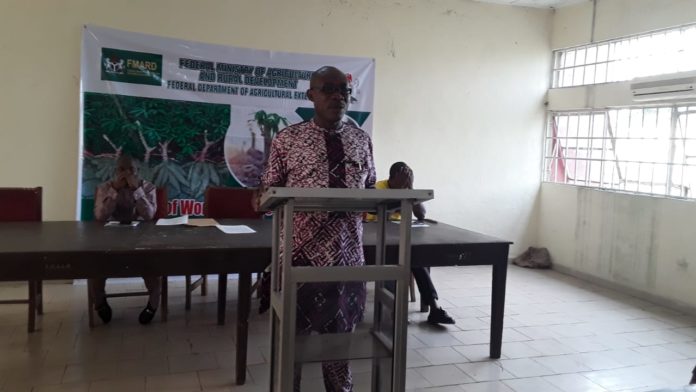The Federal Government has embarked on the Training and Empowerment of Smallholder Farmers on Cassava Value Chain Production in Abia State particularly Women and Youths of Omoba in Isiala Federal Constituency at National Soil Laboratory,Umuahia.
This is part of its efforts to ensure that the yield gap in cassava is addressed through dissemination and adoption of improved technologies as well as innovation by smallholder farmers.
The cassava farmers were exposed to how best to grow a good cassava crop which include: good site selection; proper land preparation; choosing desirable/improved varieties; healthy cassava stems selection, high yielding resistant varieties among other best practices.
Speaking during the Training at National Soil Laboratory, FMARD, Umuahia, the Abia State Director, Federal Ministry of Agriculture and Rural Development, FMARD , Mr. Victor Ihediwa said that the Federal Government is diligently working towards achieving food and nutrition security through its various activities by using a combination of policies and appropriate Agricultural technologies that would lead to job and wealth creation as well as improve living standards.

He said one of the ways in which the FMARD through its department of Agricultural Extension is working to achieve this objective was through the promotion of various crops such as cassava in which Nigeria has comparative advantage in production.
“This is coupled with encouraging Youth and Gender empowerment activities that will not only increase productivity and income but also offer more economic opportunities to farmers in the cassava value chain”, Ihediwa added.
He expressed optimism that the Training would facilitate the creation of sustainable cassava production system, provide increased yield productivity, ensure good agronomic practices, and empowerment of Youths and Women in production.
The Resource Persons who include: Mr. Yakubu Ibrahim from FMARD and Agric Extension Officer, Mr. Daniel Ikechukwu Ndukwe exposed the farmers on how best to handle hardwood cassava stems to prevent bruises and damage to the nodes and to improve sprouting.
Other aspects of planting to improve cassava production touched by the resource persons include: the selection of the correct planting time; method of planting cassava cuttings; correct plant spacing; early weeds control; herbicide use in root and tuber crops; how to improve the physical and chemical properties of the soil; better land utilization, reduction of soil erosion and risk of crop loss by inter cropping cassava with either maize or legumes.
Others include diseases and pests control: cassava harvest at appropriate time; and proper storage of cassava stems.
Some of the Trainees who include: Mr. Hyacinth Agbara, Ukaonu Uchenna, Comfort Uko, Mr. Young Okezie, Agbara Mary Ogechi, Nwogwugwu Divine Ijeoma among others lauded the Federal Government for giving them sufficient information through the programme, which will help to improve their farming capacity and well-being in cassava business.
The event saw the Director of Extension, Mr. Frank Satumari Kudla represented by Mr Yakubu Ibrahim distribute knapsack sprayer to the cassava farmers.








